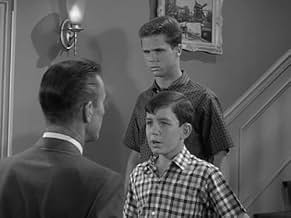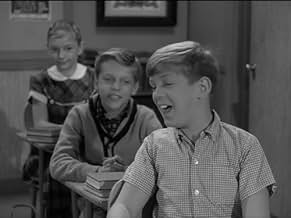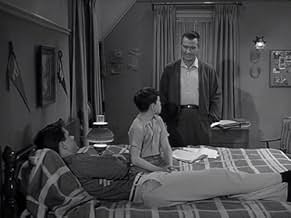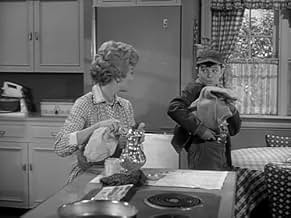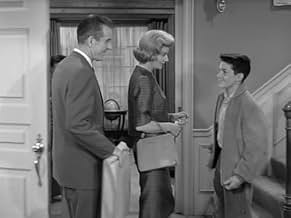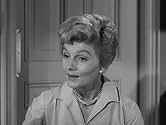Las desventuras de un chico de un barrio bien, su familia y sus amigos.Las desventuras de un chico de un barrio bien, su familia y sus amigos.Las desventuras de un chico de un barrio bien, su familia y sus amigos.
- Nominado para 2 premios Primetime Emmy
- 5 premios y 4 nominaciones en total
Explorar episodios
Reseñas destacadas
A TV Sitcom from the late 50's featuring the every day life of a family that was funny and sometimes absolutely hilarious. Not all the family oriented shows from this period could boast this. Even after nearly forty years since it ended it's run the shows remain un-dated and still great. (Much like the legendary I Love Lucy) The friends of Wally and Beaver and June and Ward were really what made the show a classic. Lumpy Rutherford and his dad Fred, Whitey, Richard, Gilbert, Larry Mondello and of course
.. Eddie Haskell! As far as I'm concerned the reruns of this classic show could be broadcast on prime time and I'd watch it in favor of todays sitcoms.
Leave It To Beaver will always be one of my all-time favorite shows. I can remember coming home for lunch each day from school and watching Leave It To Beaver at 12.00 o,clock . It has been on the same channel(The New VR) & time slot for over 25yrs. I still love watching it now into my thirtys. This show has stood the test of time, and should still for generations to come.
There were some shows that were not as good as others. But there are some that are classics!! A few of my best ones are:
1) The Haircut: This is the one when Beaver keeps losing his lunch money. And when Ward gives him money for a hair cut, he loses the money again, he asks Wally to give him the hair cut. Wally really scalps him.
2) Wally,s Car: This is the episode when Wally buys a car for $25dollars. The car needs alot of work on it, so he starts to take it all apart. Ward gets mad & tells Wally to get rid of it. He decides to sell it for parts & makes alot more money that the $25.00 bucks he paid for it. Ward in the meantime has made arrangement to have the car towed away. When the man shows up to pick it up he says one of the funniest lines. "It Looks Like A Fish Thats Been Boned!!" This is a great show.
3) The Younger Brother: Beaver trys out for the junior boys basketball team but the coach soon realizes that Beaver is not the same kind of player that Wally was. He gets cut from the team. When Ward & Fred Rutherford decide to drop in on one of his practises they find out that he,s been cut from the team.
There are so many more great shows that I could have listed. Out of all of the cast members, I would have loved to met the late Hugh Beaumont. He was excellent as Ward Cleaver & is sadly missed.
It will be a really sad day if this show ever stops showing reruns. May it live on forever.....
There were some shows that were not as good as others. But there are some that are classics!! A few of my best ones are:
1) The Haircut: This is the one when Beaver keeps losing his lunch money. And when Ward gives him money for a hair cut, he loses the money again, he asks Wally to give him the hair cut. Wally really scalps him.
2) Wally,s Car: This is the episode when Wally buys a car for $25dollars. The car needs alot of work on it, so he starts to take it all apart. Ward gets mad & tells Wally to get rid of it. He decides to sell it for parts & makes alot more money that the $25.00 bucks he paid for it. Ward in the meantime has made arrangement to have the car towed away. When the man shows up to pick it up he says one of the funniest lines. "It Looks Like A Fish Thats Been Boned!!" This is a great show.
3) The Younger Brother: Beaver trys out for the junior boys basketball team but the coach soon realizes that Beaver is not the same kind of player that Wally was. He gets cut from the team. When Ward & Fred Rutherford decide to drop in on one of his practises they find out that he,s been cut from the team.
There are so many more great shows that I could have listed. Out of all of the cast members, I would have loved to met the late Hugh Beaumont. He was excellent as Ward Cleaver & is sadly missed.
It will be a really sad day if this show ever stops showing reruns. May it live on forever.....
Leave it to beaver is remarkable. i still wonder why people never make clean humored shows like this. all it is on TV nowadays is sexual jokes and just plain old B.A.D.
Theodore "beaver" cleaver is the average American boy. he likes baseball, he has an older brother, and he's got friends who are total dummies. and he's always doing something, and learning something at the same time, with a little humor and funny comments you only find in readers digest.
when i heard of this show at first, i thought it was a normal show, but when i saw it for the first time last summer, i thought it was hilarious! if you remember the show from the 50's and 60's, NowTV has it at 6:30 every weekday. if you haven't seen it, you should. then you'll know what a real family show is.
this is a 10/10, dude
Theodore "beaver" cleaver is the average American boy. he likes baseball, he has an older brother, and he's got friends who are total dummies. and he's always doing something, and learning something at the same time, with a little humor and funny comments you only find in readers digest.
when i heard of this show at first, i thought it was a normal show, but when i saw it for the first time last summer, i thought it was hilarious! if you remember the show from the 50's and 60's, NowTV has it at 6:30 every weekday. if you haven't seen it, you should. then you'll know what a real family show is.
this is a 10/10, dude
"Leave It to Beaver" (1957-1963) is a family show set in the suburban town of Mayfield that focuses on the Cleaver family: Ward (Hugh Beaumont), father and accountant; June (Barbara Billingsley), wife and stay-at-home Mom; and their two boys, Wally (Tony Dow) a teenager, and their youngest, Theodore, better known to everyone as "Beaver" (Jerry Mathers). While television of the 1950s and '60s had its share of family shows during its black and white age, including "Father Knows Best" with Robert Young and Jane Wyatt; "The Donna Reed Show" (with Donna Reed and Carl Betz); "Dennis the Menace" (starring Jay North); and later, the long running series, "My Three Sons" (1960-1972) with Fred MacMurray, it seemed unlikely that "Leave It to Beaver" would become the one sit-com to survive and continue to air on television, whether locally or on cable, decades after its concluding episode in 1963. The aforementioned family comedy shows had its share of reruns before slowly disappearing to Limbo, replaced by newer programs to its Color- oriented viewers, but this innocent black and white show which was done on film and not on video tape and to date never colorized to attract younger viewers, still entertains as is. "Leave It to Beaver" geared to its younger viewers when first aired, but today, the children who loved it back then are either adults or grandparents currently sharing their TV memories with their young ones. And the tradition continues.
Like most long-running shows, this one lasting six seasons, the earlier episodes are the best, mixing comedy, charm and well scripted dialog. It's obvious that the writer or writers who developed this program had fond memories of what it's like being a child, for that many of the show's characters, mainly children, could easily be identified by someone we at one time had know in our youth, one character in particular being Judy Henson, the school's pony tailed tattle-tale, teacher's pet and know-it-all. Beaver's closest friend during the first couple of seasons was the chubby Larry Mondello, while Wally's pals were Chester, Tooey and the conniving Eddie Haskell. Over the years, characters have come and gone, but the writers managed to find new friends for Beaver while they kept and expanded the Eddie Haskell character, played to perfection by Ken Osmond, one of the most memorable and "smooth" characters created and developed. Along the way, Chester and Tooey were just phased out, and a new character, Clarence "Lumpy" Rutherford (Frank Bank) stepped in. At first, Lumpy was the neighborhood bully who hounded Wally and the Beav, to eventually became one of Wally's closest friends.
With each passing season viewers got to see the show's new opening, watching the boys growing and maturing to young adults by season six. During the final season, the instrumental theme song remained the same, though jazzed for its final season (1962- 63). By then, Beaver, the central titled character has turned 14, losing his innocent and boyish charm and becoming least interesting character. With the writers sensing this, the scripts placed Beaver in support in several episodes while stories revolved around more on Wally and his friends. There were even segments in which either Lumpy or Eddie would have almost an entire episode, but when Beaver became the central character, it lacked something, becoming mediocre episodes. By mid season, Beaver would start becoming more interested in girls. After 235 episodes, the Cleaver family went into retirement.
The amazing aspect about this program is the development of its characters, not only the central ones but the supporting crew. Aside from Ken Osmond's ever so polite Eddie, who's well mannered in front of the adults and a "big mouth, wise guy" to his pals, there's Richard Deacon as Fred Rutherford, Lumpy's father; the charming Sue Randall as Miss Landers, Beaver's teacher; Burt Mustin as Gus, the fireman; Beaver's other friends including Stanley Fafara as Whitey Whitney, who appeared occasionally through the show's six seasons; Stephen Talbot as Gilbert, and Richard Correll as Richard Rickover. The show might have its share of contradiction, there was a Violet Rutherford, Fred's daughter/ Lumpy's sister, who disappeared, leaving Lumpy the Rutherfordf's only "offspring," while Gilbert Bates introduced as the only child of his widowed father, to suddenly have a mother and sister in later episodes who never appear.
Aside this being a comedy show, "Leave It to Beaver" does take time out for some tender moments. In almost every episode, after either Wally or the Beav, or both, get tangled up with problems, whether it be their fault or not, there is usually a good father to son(s) lecture, along with the moral lesson to what's occurred. One in particular line recited by Ward (Hugh Beaumont) to his wife, June, that stands out is, "The way to get your children's love is to first earn their respect." Occasionally mother June would have her moment of truth with her boys as well, giving them the lesson, value and facts of life, something currently missing in today's TV family sitcoms. And even when the parents are in the wrong, this is one of those rare cases in which the TV Dad or Mom will come out and admit it, showing its viewers that even the parents aren't perfect, but they do what's best for their children as well as learning from their own mistakes.
There are many classic episodes, the one hailed the best where Beaver gets trapped in a billboard soup bowl. Regardless of its age, "Leave It to Beaver" is harmless fun, good family viewing. There was even a 1983 reunion show, "Still the Beaver," along with a new up-to-date series, "The New Leave It to Beaver" (1985-1989). While it's good seeing those familiar faces again, a little older and slightly wiser, but minus the deceased Hugh Beaumont, who is sorely missed, nothing comes close to this original series.
Like most long-running shows, this one lasting six seasons, the earlier episodes are the best, mixing comedy, charm and well scripted dialog. It's obvious that the writer or writers who developed this program had fond memories of what it's like being a child, for that many of the show's characters, mainly children, could easily be identified by someone we at one time had know in our youth, one character in particular being Judy Henson, the school's pony tailed tattle-tale, teacher's pet and know-it-all. Beaver's closest friend during the first couple of seasons was the chubby Larry Mondello, while Wally's pals were Chester, Tooey and the conniving Eddie Haskell. Over the years, characters have come and gone, but the writers managed to find new friends for Beaver while they kept and expanded the Eddie Haskell character, played to perfection by Ken Osmond, one of the most memorable and "smooth" characters created and developed. Along the way, Chester and Tooey were just phased out, and a new character, Clarence "Lumpy" Rutherford (Frank Bank) stepped in. At first, Lumpy was the neighborhood bully who hounded Wally and the Beav, to eventually became one of Wally's closest friends.
With each passing season viewers got to see the show's new opening, watching the boys growing and maturing to young adults by season six. During the final season, the instrumental theme song remained the same, though jazzed for its final season (1962- 63). By then, Beaver, the central titled character has turned 14, losing his innocent and boyish charm and becoming least interesting character. With the writers sensing this, the scripts placed Beaver in support in several episodes while stories revolved around more on Wally and his friends. There were even segments in which either Lumpy or Eddie would have almost an entire episode, but when Beaver became the central character, it lacked something, becoming mediocre episodes. By mid season, Beaver would start becoming more interested in girls. After 235 episodes, the Cleaver family went into retirement.
The amazing aspect about this program is the development of its characters, not only the central ones but the supporting crew. Aside from Ken Osmond's ever so polite Eddie, who's well mannered in front of the adults and a "big mouth, wise guy" to his pals, there's Richard Deacon as Fred Rutherford, Lumpy's father; the charming Sue Randall as Miss Landers, Beaver's teacher; Burt Mustin as Gus, the fireman; Beaver's other friends including Stanley Fafara as Whitey Whitney, who appeared occasionally through the show's six seasons; Stephen Talbot as Gilbert, and Richard Correll as Richard Rickover. The show might have its share of contradiction, there was a Violet Rutherford, Fred's daughter/ Lumpy's sister, who disappeared, leaving Lumpy the Rutherfordf's only "offspring," while Gilbert Bates introduced as the only child of his widowed father, to suddenly have a mother and sister in later episodes who never appear.
Aside this being a comedy show, "Leave It to Beaver" does take time out for some tender moments. In almost every episode, after either Wally or the Beav, or both, get tangled up with problems, whether it be their fault or not, there is usually a good father to son(s) lecture, along with the moral lesson to what's occurred. One in particular line recited by Ward (Hugh Beaumont) to his wife, June, that stands out is, "The way to get your children's love is to first earn their respect." Occasionally mother June would have her moment of truth with her boys as well, giving them the lesson, value and facts of life, something currently missing in today's TV family sitcoms. And even when the parents are in the wrong, this is one of those rare cases in which the TV Dad or Mom will come out and admit it, showing its viewers that even the parents aren't perfect, but they do what's best for their children as well as learning from their own mistakes.
There are many classic episodes, the one hailed the best where Beaver gets trapped in a billboard soup bowl. Regardless of its age, "Leave It to Beaver" is harmless fun, good family viewing. There was even a 1983 reunion show, "Still the Beaver," along with a new up-to-date series, "The New Leave It to Beaver" (1985-1989). While it's good seeing those familiar faces again, a little older and slightly wiser, but minus the deceased Hugh Beaumont, who is sorely missed, nothing comes close to this original series.
During a recent TVLand "Top 10 Characters You Love To Hate" special, a well-known (under 40) female actress was quoted as saying that she believed sneaky Eddie Haskell to be the only character in the show that she remembered for resembling "a real person".
Though I'll agree that Ward and June might come across at times as being unrealistically conservative (for example, their sitting at home in their Sunday best for no reason) her comment was something I found hard to understand, since, Beaver was known to be the first show of it's kind to explore such teen issues as, alcoholism, divorce, and troubled teens.
It seems that many viewers also do not understand the significance of Ward's frequent reference (often shown as his sad remembrance) to his own harsh encounters with his strict Father, who made a point of "taking him out to the woodshed" to let Ward know "just what his Father meant", and how Ward, as a Father himself, deciding that he would not do the same when teaching his own sons right from wrong.
While the conservative side of the show might be a bit too much for some, in the end there is nothing wrong with that behavior either - it's a far better lifestyle than what we see in today's world, where parents sometimes see their children as a liability rather than a blessing.
Those who regularly watch Beaver know that while the corn does sometimes grow high in Mayfield, the trueness of the show's stories is what makes Beaver the timeless show that many still enjoy almost a half century after it's debut.
Though I'll agree that Ward and June might come across at times as being unrealistically conservative (for example, their sitting at home in their Sunday best for no reason) her comment was something I found hard to understand, since, Beaver was known to be the first show of it's kind to explore such teen issues as, alcoholism, divorce, and troubled teens.
It seems that many viewers also do not understand the significance of Ward's frequent reference (often shown as his sad remembrance) to his own harsh encounters with his strict Father, who made a point of "taking him out to the woodshed" to let Ward know "just what his Father meant", and how Ward, as a Father himself, deciding that he would not do the same when teaching his own sons right from wrong.
While the conservative side of the show might be a bit too much for some, in the end there is nothing wrong with that behavior either - it's a far better lifestyle than what we see in today's world, where parents sometimes see their children as a liability rather than a blessing.
Those who regularly watch Beaver know that while the corn does sometimes grow high in Mayfield, the trueness of the show's stories is what makes Beaver the timeless show that many still enjoy almost a half century after it's debut.
¿Sabías que...?
- CuriosidadesAlthough the series was still earning good ratings, its star, Jerry Mathers, wanted to retire from acting to focus on his education upon entering high school. As a result, it was agreed to halt production and the series became the first prime time American production to have a series finale.
- PifiasDuring season one, Wally was in 8th grade and Beaver was in 2nd - six years apart. By the end season six Beaver was finishing 8th grade and Wally was graduating high school - 4 years apart.
- Citas
June Cleaver: Wally, where are you going?
Wally Cleaver: I'm going over to slug Eddie.
June Cleaver: That's no way to talk, this is Sunday.
Wally Cleaver: You're right, I'll wait 'til tomorrow and slug him in the cafeteria.
- Créditos adicionalesThe actor who plays "Beaver" is always credited at the beginning of the show as "And Jerry Mathers...as The Beaver".
- ConexionesFeatured in Prime Times (1983)
Selecciones populares
Inicia sesión para calificar y añadir a tu lista para recibir recomendaciones personalizadas
Detalles
- Fecha de lanzamiento
- País de origen
- Sitio oficial
- Idioma
- Títulos en diferentes países
- Leave It to Beaver
- Localizaciones del rodaje
- Empresas productoras
- Ver más compañías en los créditos en IMDbPro
- Duración30 minutos
- Color
- Mezcla de sonido
- Relación de aspecto
- 4:3
Contribuir a esta página
Sugerir un cambio o añadir el contenido que falta

Principal laguna de datos
What is the French language plot outline for Aventuras de Pablito (1957)?
Responde



